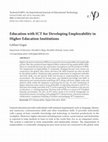Papers by Dr. Lekhan Gogoi

International Journal of Innovative Research in Technology, 2025
The task of teaching becomes challenging due to rapid technological and scientific advancement an... more The task of teaching becomes challenging due to rapid technological and scientific advancement and hence teachers satisfaction and dissatisfaction in performing their duties is utmost important for better delivery of education. More particularly, job satisfaction of women teachers who are working in different secondary schools is a vital issue for the researchers. Besides teaching, women teachers play multifarious roles in the society including rearing and caring children at home. The present study was conducted on Job Satisfaction among the Women Teachers of Secondary Schools of Dhemaji District in Assam. The study was conducted on a sample of 81 women teachers from eight secondary schools by using a standardised ‘Job Satisfaction Scale’ developed by Diixit (1993). The study found that 25.93% of women teachers (respondents) were highly satisfied; 45.6% were moderately and 28.85% showed low satisfaction towards their jobs. There was no significant difference between women teachers working in rural and urban schools; married and unmarried women teachers; and trained and untrained women teachers of secondary schools of Dhemaji District with regard to their job satisfaction. However, experienced teachers were more satisfied with their jobs than the inexperienced teachers.
Teaching Profession in 21st Century: Challenges, Perspectives and Prospects with Special Reference to North East India, 2019

Journal of Education and Development, 2013
Teaching English is a complex activity as it requires engaging teacher in selecting and arranging... more Teaching English is a complex activity as it requires engaging teacher in selecting and arranging the objects, developing learning activities, selecting teaching activities, understanding learners, planning for motivation of the students and designing evaluation procedure. English is usually taught as second language (L2) in larger context of the vernacular schools. But, the quality of teaching English in majority of the secondary schools in Assam is at the cross-road which caused the dismal performance of students in English. The methods adopted by the teachers for teaching English in these schools are mechanical and ineffective. The learning environment facilitated by teachers is not encourageous and conducive for learning English. Almost all teachers (91%) who taught English were graduate without major in English, whereas only (99%) of them was post graduate who had Major in English at the graduation level. Most of the pupils (87%) reported that the English teacher explained lessons in Assamese. No teacher explained lessons in English in the classroom. English teaching in vernacular secondary schools in Assam needs further improvement from the process of teachers' recruitment to that of creating conducive classroom environment
Workshop Volume on "Role of Internal Quality Assurance Cell (IQAC) in Promoting Internal Quality Assurance System in Higher Educational Institutions, 2009
Dibrugarh University Journal of Education, 2000
Journal of Education and Development, 2012
English today seems to be the most significant and widespread world language; and it is fast gain... more English today seems to be the most significant and widespread world language; and it is fast gaining Importance over other languages. Language learning Involves developing four skills viz. listening, reading, writing and speaking. The study made an attempt to ascertain the existing systems of teaching and learning for developing skills of English language In Assamese medium secondary schools. It was found that most of the pupils could not express in English, because of their poor word stalk and grammatical knowledge. Teachers used most traditional method in teaching English for which they were found difficult to understand English properly resulting hindrance in developing four skills of English language. Teacher should pay more attention to develop the skills by creating a congenial learning atmosphere in the school.
Journal of Education and Development, 2011
Higher Education is a potent agent of developing capable human resource required for nation build... more Higher Education is a potent agent of developing capable human resource required for nation building. But the management of the institutions imparting higher education is today at the crossroad. The present study found that the quality of higher education institutions has been deteriorated due to political intervention and the campus of these institutions has been highly politicized by student organizations; outside political parties; teacher organizations; and non- teaching employee associations in the form of calling boycott, a bandh and demonstrating dharna.

Intrnational Journal for Research in Education (IJRE), 2024
Preparing teachers professionally competent and committed to the cause is the responsibility of t... more Preparing teachers professionally competent and committed to the cause is the responsibility of the teacher education system. The historical perspective provides a sound background for evolving an effective teacher education programme of a country. This study made an attempt to trace out the early initiatives for the development of Teacher Education in Assam, to study the development of Teacher Education in Assam under the British rule, and to find out the status of Teacher Education in Assam at the time of Independence. The study found that the development of Teacher Education was taken place in the form of Normal Training Schools. The first normal class was started at Gauhati School by William Robinson in 1844. At the time of Independence, there were total ten Normal Schools in Assam, out of which there ere only three government Normal Schools meant for training of male teachers at the time of Independence. Training of Secondary School Teachers was not found during this period.

TechnoLEARN: An International Journal of Educational Technology, 2016
Higher education institutions (HEIs) are expected to form responsible and employable citizens. Bu... more Higher education institutions (HEIs) are expected to form responsible and employable citizens. But, they produced mere degree holders without having employability skills. There is a mismatch between the expectations of employers and the products of HEIs. The requirement of employability is continually changing because most sectors are connected to the global value chains and hence the skills required are often decided by the global markets. Employers place greatest importance on employee’s attitudes and basic skills over job specific skills and having an understanding of the work environment. The demand for having basic and updated knowledge and skills of information and communication technology (ICT) along with basic, higher order and affective skills within the employee is growing day by day. As such, institutions of higher education today need to focus preferably on imparting education with ICT so that basic knowledge and skills of ICT can be acquired by the students in the process of education, i.e. teaching-learning. The basic task of HEIs is to create an ICT-enabled learning environment. For this, an ICT policy needs to be evolved strategically for institutional practice including well equipped ICT infrastructure, education-industry collaboration, competence building of teachers and pedagogy-ICT integration.)

International Journal of Creative Research Thoughts, 2018
Success of education, to a large extent, depends upon evaluation system which determines the lear... more Success of education, to a large extent, depends upon evaluation system which determines the learners’ achievement in terms of their knowledge, skills and attitudes developed through teaching-learning system. Evaluation needs to focus adequately on both scholastic and non-scholastic areas of development. The present investigation attempted to study the nature and methods of continuous and comprehensive evaluation adopted in secondary schools; to find out the suitability of it from the perception of students; to make a comparative analysis of CCE adopted in private and government provincialised secondary schools; and to find out the problems in the maintenance of CCE in schools. The descriptive survey method was used and collected data from a sample of 88 working teachers and 124 students (40%) studying in four secondary schools. The study found that almost all the schools adopt a school based evaluation system in written and oral types, but activity based performance was not given due place; class tests, unit tests and half yearly examination were conducted; schools under study followed participation in games & sports, cultural activities, literary activities and students’ discipline, but other non-scholastic aspects related to work education, physical education and social development were neglected. Compared to private schools, government provincialised secondary schools were found to have more problems.

Journal of Emerging Technologies and Innovative Research, 2024
Secondary education is a crucial stage for every student in which the child starts developing car... more Secondary education is a crucial stage for every student in which the child starts developing career awareness along with academic acquisition. The present investigation was conducted to ascertain the career aspirations of secondary school students and some other factors that affect career path of students. The objectives of the study were to study the career aspirations of secondary school students; to find out the parents aspirations towards the career of their children; to study the awareness of secondary school students towards career choice; and to study the initiatives taken by secondary schools for career awareness of the students. The pertinent data collected from a sample constituted of 314 students of class IX and X randomly selected from three Secondary Schools of Dhemaji Education Block. A ‘Questionnaire’ was developed and used for data collection. Simple statistical techniques of frequency and percentage were used to analyse the data of the study. The study found that as many as 31.52% and 25.48% parents desired that their children would be in police or defense services and doctor, respectivly. Similarly, career aspirations of 29.93% and 26.43% of students were found to be police or defence services and doctor, respectively. Almost all (88.54%) of the students were encouraged by their parents, whereas as many as 10.51% them made career choices in their own interest. Most of students (85.03%) were found to be aware about the educational qualifications required for their choosen career. Most of the students (78.66%) revealed that their teachers sometimes discussed about career development with them. But, most of them 82.48%) reported that their schools not at all organised any career counselling programme. Almost all secondary school students (92.99%) thought that career counselling should be an integral part of regular curriculum. Thus, career guidance and career counselling programmes should be organised regularly at secondary schools.










Uploads
Papers by Dr. Lekhan Gogoi